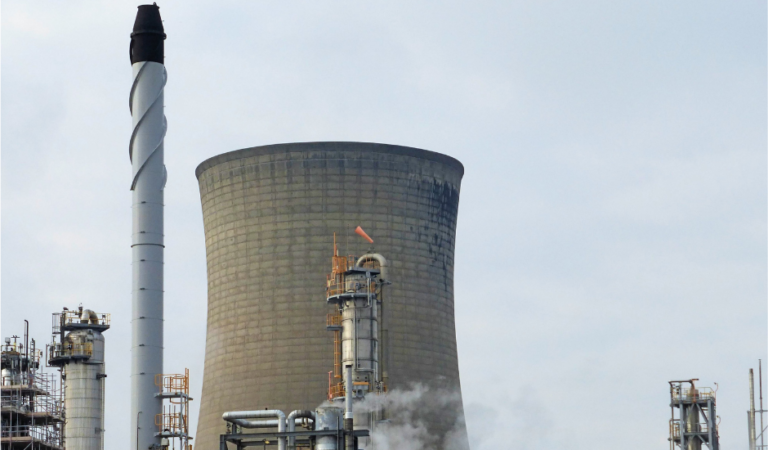 23rd September 2022
23rd September 2022Common Cooling Tower Maintenance Problems
Maintenance of cooling towers is an essential aspect of running any HVAC (Heating, Ventilation, and Air Conditioning) system. A correctly built system, when correctly managed, will offer a comfortable interior climate for domestic, business, and industrial buildings throughout the year.
The mix of air, water, heat, and chemicals may create a highly corrosive habitat in which certain cooling tower parts are more vulnerable than others. They can often be overlooked. Cooling towers are made of galvanised steel and can develop a variety of functional issues over time.
That’s why this blog will cover some of the more typical cooling tower maintenance issues that you should be looking out for in order to keep your tower protected. We’ll also include some known solutions for preventing against these issues.
Maintenance Problems with Cooling Towers
Buildings with cooling towers must monitor different challenges relating not just to the actual structure and mechanics but also the water treatment.
Some of the most common problems are:
- Corrosion
- Contamination
- Pipelines
- Scaling
All of these issues can limit the cooling tower’s potential to perform as energy efficient as they’re often designed to be. Because these problems can seriously harm the performance of the tower, they will require more electricity in order to function suitably. Something like this will increase the expenses that your company is spending.
Corrosion
Leaks in cooling towers are often caused by neglection to the system, especially in towers with closed loop systems. Air, sodium, and other chemicals that are contained in our water sources stream through cooling tower systems unchecked which means that they’ll eat away at the tower material and cause leaks.
These can potentially jeopardise the overall safety and effectiveness of the cooling process as the issue of leaks can impact numerous regions of the tower, particularly the joints and seams. Failure of these components can expose elements of the framework and make it more susceptible to damage.
Luckily, there’s also solutions to this problem. Using coatings, controlling the water treatment, or raising the pH of the water so it’s alkalic will help prevent against corrosion. They’ll help to extend the lifetime of your system and maintain its high performance abilities.
However, it’s important to keep a balance as a pH that’s too high will affect the effectiveness of chlorine water treatments – something that is necessary to prevent contamination, too.
Contamination
Naturally, cooling towers are very humid and hot and that provides a great environment for undesirable organisms, like bacteria, to grow. These toxins are harmful to humans and far worse for the efficiency of your cooling system.
The bacteria manifests itself as biofilm which accumulates on the interior components of the structure. Even coatings that are relatively thin can significantly diminish thermal efficiency.
Collecting a water sample will tell you whether or not it is contaminated. As contamination is extremely dangerous, it’s essential to manage the water in the tower as well as the actual tower. So it’s treated by flooding the system with chlorine at varying doses over a 48-hour period.
Then there’s a full flush of the system along with a refill of fresh water.
Pipelines
Pipe systems connect the cooling towers to other components in a HVAC system. And just like any mechanical system, the pipe system can fail, too. A combination of interior and exterior rusting can result in the walls thinning which will have a major influence on both the structure and operation of the system.
Furthermore, movement between pipes and the tower can cause improper connections to form which, in some circumstances, can lead to leaks or holes.
Putting a protective coating over the piping system and making sure the entire system is fully connected. Poorly applied coating systems will fail in any situation where components are warm, humid, or submerged.
Scaling
Scaling is a thin covering of materials – mineral or chemical – that insulates the tubes, in turn preventing effective heat transmission and also limiting the unit’s production. This is because there is a build-up of back pressure.
The calcium content in the water is mainly the major cause of scaling so it should be checked and, if necessary, rectified.
Tube coatings composed of polymers are an incredibly effective preventative measure against scaling. These coatings offer a heat-conductive surface to preserve performance while not allowing calcium to gather and build up.
In cases of severe scaling, cleaning techniques can be used to eliminate the scaling. At this point, there is an ideal opportunity present to employ chiller tube coatings for further scaling prevention.
Reach Out to Clarion Water
Clarion Water has a promising 30 years of combined expertise and understanding in the water hygiene industry. Therefore, we have just as much experience with cooling tower projects.
Because of that experience, we can be confident that the risk assessments and water treatment services we provide will make sure every customer is complying with water hygiene legislation.
Thanks to our knowledgeable and skilled team, our clients get a more reliable quote and project plan and we typically foresee any potential issues and risks and create a solution plan. Every protective coating we apply to tower or tank components is WRAS approved and our application method ensures a robust, reliable coverage.
Have any cooling tower concerns? Or want to get a quote for a cooling tower repair? Don’t hesitate to reach out to us by calling 01943 872 311. Alternatively you can send a quick email to info@clarionwater.co.uk. One of our team will reply to you ASAP.